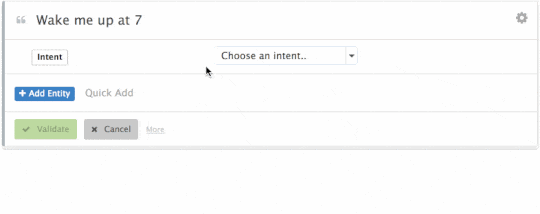We may often find ourselves uttering to a stubborn appliance or device. “Television, turn on.” Soon, though, it could be more common for those devices to actually listen and obey our commands. Several large companies such as Google and Apple have their own voice recognition technology; however, smaller companies and independent developers don’t have the necessary budget to create voice software that continuously learns from collections of data. A startup called Wit.ai plans to make it easier for these smaller companies to add custom voice controls to everything, including (but not limited to) smartphones and smart watches to Internet-connected thermostats and drones.
With Wit.ai, developers type a handful of plain-English commands they want it to recognize such as “Wake me up
tomorrow at 6″ or Wake me up in 30 minutes,” and note what they want to accomplish through each command. In this case, set the alarm on a hypothetical voice-controlled smart watch. In an MIT Technology Review, Rachel Metz explains: “Wit.ai uses what it knows about language to figure out the different ways a command might be expressed. Then, when a user wants to set the alarm for a specific time, that person’s utterance’s are sent to a Wit.ai server, which analyzes the audio and sends structured data back to the gadget.”

Nick Mostowich, a student at the University of Waterloo in Ontario, attended a hackathon last month at his school at which he and his team used Wit.ai to add voice control to a toaster and microwave. Mostowich says they quickly put together a set of “commands and targets that could be mapped to a list of recipes on a remote server, so a user could say something like, ‘Cook me some bacon’ and the microwave would turn itself on, set to the right power level and time.”
For his project submitted for the hackathon, Home Ease, Mostowich and his team wanted to prove that home automation can be “cheap, simple, open and fun,” and he utilized the technology at Wit.ai to prove this. He firmly believes that home automation may benefit the general population, but especially benefits individuals with disabilities.
There are plenty of obstacles Wit.ai needs to overcome. Many similar systems, like Siri, rely on the cloud meaning it’s not as quick to respond as it could be, and it can’t work if you don’t have an internet connection. However, with the 4,600 developers sending data to Wit.ai, cheap, simple, voice-controlled home automation may be coming to a house near you soon.
